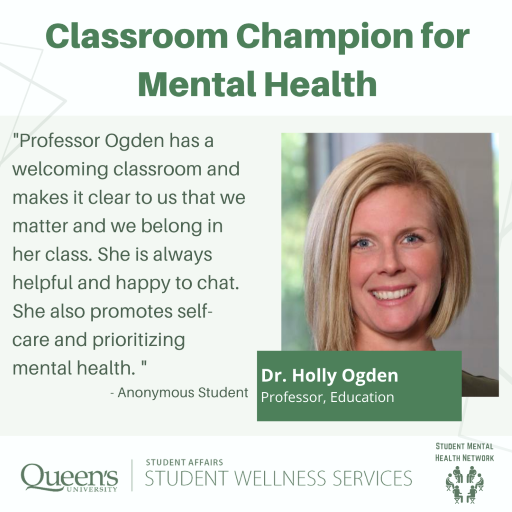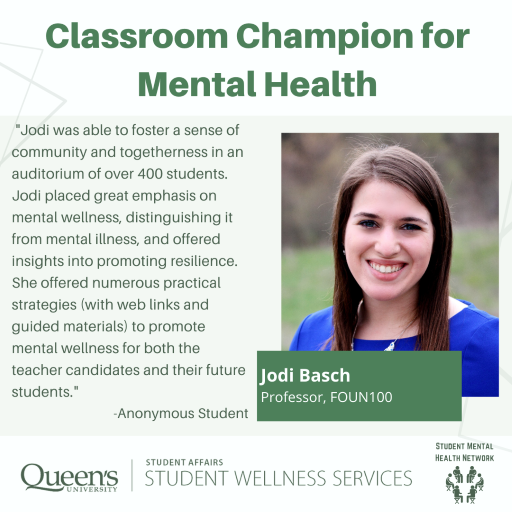Educators play a strong role in supporting and advancing student mental health. The Classroom Champions in Mental Health program is a student-led initiative, responding to both student feedback and clear research calling for increased mental health promotion in academics.
Classroom Champions in Mental Health recognizes and celebrates professors, instructors and TAs who create supportive learning environments where student mental health is valued and supported.
The Classroom Champions for Mental Health project aligns with the Queen's Campus Wellbeing Framework. The framework's goal is to encourage and support an inclusive culture of wellbeing that inspires and enables all who live, learn, and work at Queen's to thrive.
The Faculty of Education was thrilled to have two of our educators recognized as Classroom Champions in Mental Health - Dr. Holly Ogden and Jodi Basch.
Dr. Holly Ogden
 For me, mental health is a combination of our emotional, social, and psychological well-being. Mental health relates to how each of us uses strategies to cope with stress, meet our basic needs, and engage in healthy relationships with ourselves, others, and the world around us. We can all support our mental health by practicing self-care physically, emotionally, socially, spiritually, and mentally.
For me, mental health is a combination of our emotional, social, and psychological well-being. Mental health relates to how each of us uses strategies to cope with stress, meet our basic needs, and engage in healthy relationships with ourselves, others, and the world around us. We can all support our mental health by practicing self-care physically, emotionally, socially, spiritually, and mentally.
I hope that each of my students know and feel that they are central to everything that happens in our classes. I believe in making connections and working hard to develop a strong sense of community in our classes. By starting each session with students sharing their stories, news, and recommendations, we learn about each other and find ways to connect. By seeking and using student feedback regularly, I can make sure that the course content connects to student needs, curiosities, and interests. By planning learning tasks and assignments that are flexible, student-centred, and designed with formative assessment embedded throughout, I hope that I am modelling how educators can support student-centred learning and healthy management strategies for their future students. I strive to offer opportunities for students to share strategies and resources, to have choice and autonomy, and to connect with others regularly.
I think it's important to recognize how much the students themselves support one another and understand what they need and what they can do to be healthy. I learn so much from my students and believe that my mental health is strengthened when I engage with them.
- Dr. Holly Ogden
Jodi Basch
 Mental health is our ability to cope with our day-to-day challenges. It consists of our thoughts, feelings, perspectives, strengths, sense of balance, ability to be resilient, and connection to ourselves and others. If our mental health is strong, it does not mean that we will not experience hardships or negative emotions. It just allows us more capacity to navigate those difficult experiences. On the other hand, if we are not feeling well mentally, it may take more effort and energy to overcome our difficulties. It is normal for our mental health and sense of well-being to fluctuate. However, if our individual mental health is consistently moving away from our baseline, it is important to ask ourselves why, and consider what resources would be effective in supporting ourselves.
Mental health is our ability to cope with our day-to-day challenges. It consists of our thoughts, feelings, perspectives, strengths, sense of balance, ability to be resilient, and connection to ourselves and others. If our mental health is strong, it does not mean that we will not experience hardships or negative emotions. It just allows us more capacity to navigate those difficult experiences. On the other hand, if we are not feeling well mentally, it may take more effort and energy to overcome our difficulties. It is normal for our mental health and sense of well-being to fluctuate. However, if our individual mental health is consistently moving away from our baseline, it is important to ask ourselves why, and consider what resources would be effective in supporting ourselves.
I support student mental health by providing mental health resources, offering support when appropriate, teaching students how to recognize their own needs, providing a safe space to learn, and encouraging students to make decisions that align with their values. I remind students that their well-being is the priority by outlining ways in which they can care for their mental health and providing strategies so that they can teach others to care for their mental health as well. I also invite students to reach out to me if they need a space to talk or require any specific support.
Educators can support and enhance student mental health by modelling what appropriately caring for their mental health looks like. When appropriate, if educators can be vulnerable and share stories of their personal challenges with their mental health, it allows students to recognize that their emotions are universal and valid. This can, in turn, reduce the stigma associated with talking about mental health. If students do not feel as if they have a safe space to learn, their overall well-being may be diminished, and they may not have the capacity to focus on their studies.
Just as we have a physical immune system, it is important to recognize that we also have a psychological immune system. It is important to be kind to ourselves through the challenges that we will all inevitably face and allow our psychological immune system to do its job. Some days it may feel as if we have more reserve than others and other days it may feel like any challenge will push us over the edge. If we discover what we need on both the good and the bad days, it will be easier to live both presently and authentically.
-Jodi Basch
